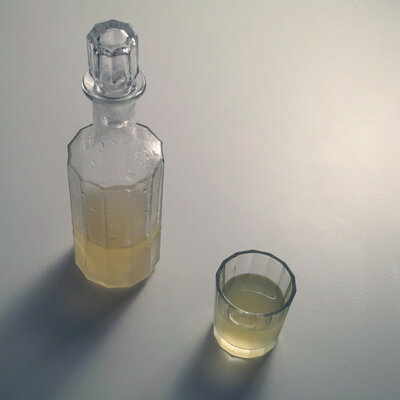limoncello impatience
I have a certain fondness for limoncello, an Italian lemon liquer, after having it for the first time in Sorrento. Recently, I made my first batch in the traditional manner... which took about a month. If you're like me, you find something vaguely offensive about recipes with verbiage like "as long as possible"; to quote The New York Times, the key ingredients of limoncello are "lemons... alcohol, sugar and, most of all, patience." A quick application of Amdahl's law tells us to spend our time optimizing the extraction and aging periods, so I've spent some effort experimenting with the process.
what's going on
The first stage is extraction of the various oils and organic compounds that make limoncello lemon-y. There are two faster approaches I can think of: use a better solvent, or add energy to the system. We can't use a more agressive solvent for drinking than high proof alcohol. The standard approach to add energy is heat, but reportedly this harms the taste. Some people experiment with alternating high and low pressure to speed up infusion, but the devices and supplies for that are not practical for the casual, uh, limoncellist. However, at the molecular level, increasing heat really just means shaking molecules around more vigorously. What's a great way of shaking things, and also getting pressure effects?
I happen to have a lab-grade ultrasonic bath (planned for use with inkjet printable silver nanoparticles for printed circuitry, need to revist that eventually). The usage is pretty simple: fill the bath with water and sit the jar of proto-limoncello in the basket. The rest of my experimental process was just tweaking ratios and timing.
how it's done
To make 400ml of limoncello:
Ingredients:
- 4 lemons
- 200ml of 50% ABV vodka (i.e. 100 proof)
- 134ml simple syrup (don't spend time making it, just buy a bottle)
- 66ml water
Instructions:
- Zest the lemons lightly. Don't delve too greedily and too deep, if you get any pith you'll get a nasty bitter flavor.
- Put the zest and vodka in a glass bottle.
- Zap it with the ultrasonic bath for 30 minutes.
- Strain the fluid.
- Filter the fluid through a coffee filter.
- Filter the fluid through another coffee filter.
- Add the simple syrup and water.
- Zap it with the ultrasonic bath for 30 minutes again.
- Put your bottle in the freezer for 45 minutes.
commentary
Limoncello is all about the ratios. Unfortunately, this is an empirical matter, and personal preference should guide your conclusion. I like my limoncello at around 25% ABV, so the recipe above results in:
- 25% alcohol
- 33.5% simple syrup
- 41.5% water
Some other notes:
- Keep in mind the correct drinking temperature (at least refrigerated, if not kept in the freezer): a warm limoncello should taste far too sweet
- More simple syrup makes it both sweeter and more viscous, which are both important characteristics of limoncello
- I've decided on a 1 lemon to 50mL of vodka ratio, but it could go lower, like 75mL, or even 100mL per lemon, if you zap it longer, but I think tastes slightly better with more lemon
- Higher proof alcohol may influence the taste and speed of extraction, but I think if you keep the final ratio the same, it won't matter, since we cheat so aggressively with this method
- The freezer part is important, I believe it has a blanching effect that seriously improves stability
- I've been thinking about using some kind of aeration device to oxidize it more aggressively during the second phase
In conclusion, we've achieved a roughly 62700% speedup, which I think is pretty good. I hereby tentatively claim the limoncello speedrun world record. Tastewise, my unrefined palate says the result compares well to Villa Massa. Salute!
